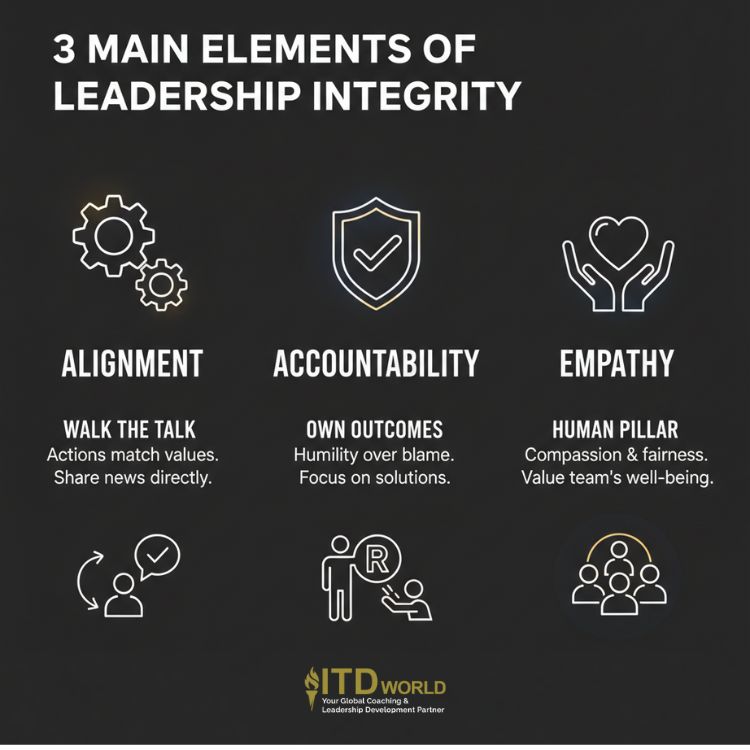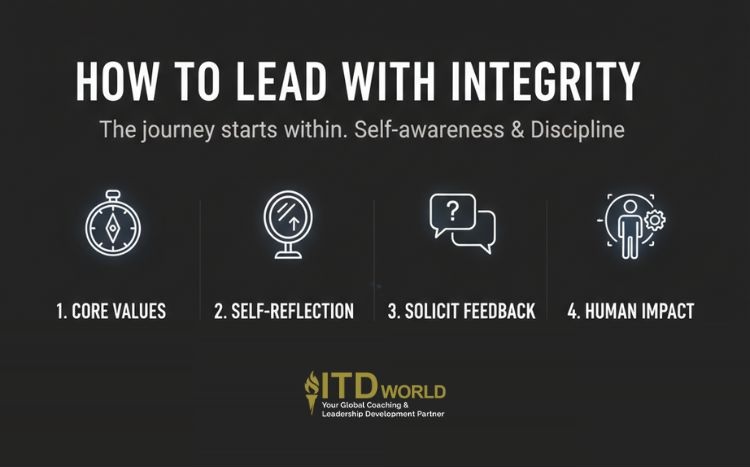A comprehensive blueprint for understanding integrity in leadership and cultivating this quality – while also navigating its challenges.
“The supreme quality for leadership is unquestionably integrity,” Dwight D. Eisenhower once declared. In the modern business world, this insight has never been more critical. Integrity in leadership is not merely a passive moral virtue; it is an active business initiative – the absolute foundation upon which all trust, influence, and sustained success are built. Without it, even the most brilliant strategy is destined to fail.
|
Author: Jonathan M. Pham |
Highlights
- Leadership integrity is the state of being whole and undivided – the courageous and consistent alignment of a leader’s actions, words, and core values (“walking the talk”). It is not about perfection, but about being consistent, especially when faced with difficult choices or when no one is watching.
- Integrity is vital because it drives trust, enhances team performance (collaboration, resilience), and provides an essential filter for ethical decision-making.
- Integrity is built on three pillars: Alignment (clarity and consistency with values), Accountability (owning commitments and outcomes with humility), and Empathy (applying standards with compassion and fairness, and avoiding the “integrity paradox” of being too rigid).
- The journey begins defining a clear core values and leadership philosophy (your “personal constitution”). This must be reinforced by rigorous self-reflection (acting as your own auditor) and actively soliciting feedback to expose blind spots, ensuring your intent matches your impact. Leaders must also intentionally consider the human impact and long-term consequences of every major decision.
- Leading with integrity means navigating significant pressures, primarily the conflict between core values and the demand for short-term performance. Other traps include the ego trap (fear that admitting mistakes shows weakness; solved by modeling vulnerability) and the integrity paradox (being too rigid and lacking compassion; solved by applying standards skillfully with empathy and context).
What is Integrity in Leadership?
Leadership integrity is the state of being whole, unified, and undivided. It is the courageous and consistent alignment of a leader’s actions, words, and core values. Rather than merely talking about a set of principles, they “walk the talk” and embody them in their daily decisions and behaviors.
As you may see from the definition above, integrity is not about being perfect, but about being consistent. It’s what one does when faced with a difficult choice – or when no one is watching/ giving credit for it.
Example: A leader with integrity will choose to delay a product launch to fix a known quality issue, despite the immense pressure to meet a quarterly deadline, because their core value is “quality first.”
The Crucial Distinction: Honesty vs Integrity in Leadership
Integrity is telling myself the truth. And honesty is telling the truth to other people.
Spencer Johnson
These two terms are often used interchangeably, and yet they are not the same.
- Honesty is an external act. It’s about telling the truth to other people and not deceiving them.
- Integrity is an internal state. It’s about being true to yourself and your own values.
In reality, a leader can be honest without having integrity. For instance, one might tell their team, “I have to cut your training budget to boost our short-term profits.” While this is true, it also violates a stated company value of “people development” – in other words, there is a gap between words and actions.
A leader with integrity, in contrast, would fight for the training budget – because it aligns with their core principles.

The Importance of Integrity in Leadership
Why integrity matters
If you have integrity, nothing else matters. If you don’t have integrity, nothing else matters.
Alan Simpson
- Drives trust & performance
Research from the International Journal of Leadership Studies found that ethical leadership behaviors – especially integrity – significantly increase followers’ trust in their leaders. This trust is what allows a leader to have genuine influence rather than just formal authority.
When teams have faith in their leaders, they are more collaborative, more innovative, and more resilient in the face of change and uncertainty. This is the key component of any high-performing organization.
- Enhances decision-making
Integrity provides a crucial filter for complex decisions. It forces one to take into account long-term consequences, ethical implications, and stakeholder impact, rather than just short-term, expedient gains.
As a 2025 study published in Advances in Research identified, integrity is a “strategic pillar for ethical decision-making,” which ultimately protects the organization from catastrophic, long-term risks.
The high cost of a lack of integrity
In today’s highly transparent, digital-first world, a leader’s lack of integrity is more visible and more devastating than ever. A single action that contradicts a stated value can be broadcast globally in minutes, causing irreparable damage.
When leaders fail to “walk the talk,” it doesn’t just lower morale; it breeds a toxic culture of cynicism, blame, and disengagement. This “say-do gap” kills psychological safety, as employees learn that their managers’ words are meaningless.
A stark, real-world example of this is the Wells Fargo account fraud scandal that came to light in the 2010s.
- What happened: The company’s senior leadership publicly espoused a customer-first, community-bank ethos. Internally, however, they enforced a high-pressure sales system with unrealistic targets that incentivized individuals to create millions of fake accounts.
- The consequence: This gap between their stated values (integrity) and their operational reality (a lack of integrity) resulted in a catastrophic loss of customer trust, billions of dollars in fines and legal fees, and a brand reputation that was shattered for years.
People that have integrity violations should be fired, not coached. How many integrity violations does it take to ruin the reputation of your company? Just one. You don’t coach integrity violations. You fire them.
Examples of Famous Leaders With Integrity
- Leaders of nations
Those like Mahatma Gandhi and Nelson Mandela are well known for having led an entire nation (or one through reconciliation) based on the power of their integrity. What they did were perfectly aligned with their message of nonviolence, justice, and forgiveness. Their consistency, even in the face of decades of adversity, is what earned them the trust of millions and the moral authority to change the world.
- Leaders in business
The same principle is just as powerful in the corporate world. For instance, the late Dr. Kazuo Inamori, founder of Kyocera, built his global enterprise on the philosophy of “Keiten Aijin” (敬天愛人 – meaning “Respect the Divine and Love People“). His guiding principle for every decision was, “As a human being, what is the right thing for me to do?“
Eventually, his integrity-based approach not only resulted in a successful company – but was also credited with the legendary turnaround of Japan Airlines.
Importance of integrity in leadership
3 Main Elements of Leadership Integrity
-
Alignment (Clarity & Consistency)
This is what defines the “walk the talk.” It requires two things:
- First, one must be well aware of their own core values and personal leadership philosophy.
- Second, they must ensure their daily actions, decisions, and communications are in alignment with those stated values.
Example: If a leader’s stated value is “transparency,” but their team consistently finds out about major decisions through the grapevine, it’s a serious breach of integrity. Even when it’s difficult, one needs to make it a priority to share both good and bad news directly.
-
Accountability (Ownership & Humility)
Accountability means accepting personal responsibility for one’s commitments, actions, and the team’s outcomes – both positive and negative. This requires the humility to set aside one’s ego, resist the urge to blame others, and focus on solutions rather than self-preservation.
Example: When a high-profile project fails to meet its goals, a leader with integrity doesn’t search for a scapegoat. They are the first to step forward and say, “I am accountable for this outcome. Let’s analyze what we learned and how I can better support the team moving forward.”
Read more: 7 Leadership Mistakes to Avoid – From Failure to Success
-
Empathy (Compassion & Fairness)
This is the crucial human pillar that ensures integrity is not cold, rigid, or self-righteous. Empathy is the practice of compassion and fairness. Specifically, one genuinely seeks to understand the human impact of their decisions and consistently treats all team members with dignity and respect.
Example: A leader with integrity doesn’t just make a “correct” or “logical” decision; they make a just one. They avoid playing favorites, ensure that recognition and opportunities are distributed fairly, and take the time to consider the well-being of their team when setting ambitious deadlines. Their example contributes to a culture where everyone feels seen and valued, not just as “resources,” but as real human beings.
You can evaluate the quality of your authority by looking deeply to see if compassion is the foundation of your leadership.
Thich Nhat Hanh

How to Lead With Integrity
The journey to leadership integrity always starts from within. It requires the self-awareness to define your “true north” and the discipline to hold yourself to that standard.
-
Define your core values & leadership philosophy
You cannot align your actions with your values if you haven’t defined what they are yet. The first step, therefore, is to move your principles from a vague feeling to a clear, conscious commitment.
How-to: Take the time to identify and write down your 3-5 foundational values (e.g., “Honesty,” “Team Success First,” “Uncompromising Quality”).
Example: A leader might define their philosophy as, “I will be transparent in my decisions, I will always put the well-being of the team at the forefront, and I will never ask them to do something I am not willing to do myself.” This statement now serves as their personal “constitution” for every decision.
-
Practice rigorous self-reflection
A leader with integrity must be their own most diligent auditor. As such, you need to regularly reflect on your actions and ensure they do not stray away from your values.
How-to: End your workweek with 15 minutes of scheduled self-reflection. This is where you can honestly assess your own level of integrity.
Sample self-reflection questions:
- “Did my actions and decisions this week align with my stated values?”
- “When I faced a difficult decision, did I choose the right path or the easy one?”
- “Did I ‘walk the talk’ in all my team interactions?”
- “Did I fully own my mistakes, or did I look for someone or something else to blame?”
- “Did I treat every person with the respect and fairness I claim to hold dear?”
Read more: Mindful Leadership – Slow Down to Move Forward
-
Actively solicit feedback to expose your blind spots
Integrity is not just about what you intend to do; it’s about how your actions are perceived. We all have blind spots, or “say-do” gaps, where we believe we are acting the right way, but our impact on others is different. That’s why you need to have the courage to ask for feedback – and create a safe environment for the team, peers, and manager to tell you the truth.
Example: You can ask a trusted coach/ mentor or those in your team, “In what ways are my actions most consistent with my values? And where have you seen me be inconsistent?” Working with an executive coach is one of the most effective ways to get this unvarnished, objective input to close your “say-do” gap.
Read more: Intent vs Impact in the Workplace
-
Intentionally consider the “human impact”
When it comes to making a significant decision, it’s always essential to consider its impact on all stakeholders.
Example: Before rolling out a new, aggressive performance metric, a leader with integrity asks, “Will this drive the right behaviors, or will it create a toxic, ‘win-at-all-costs’ culture that violates our value of ‘Team Success First’?”
Read more: Building a Lasting Leadership Legacy

Areas of integrity in leadership
Promoting Integrity in the Workplace
You don’t build a business – you build people – then people build the business.
Zig Ziglar
Individual efforts are amplified when they are supported by organizational systems.
- Hire & promote for integrity
The most impactful message a company sends about its values is reflected in who it hires and promotes. Hence, it’s important to integrate values-based behavioral questions into the hiring process and make integrity a non-negotiable competency in the leadership promotion criteria.
- Promote a culture of transparency
When senior leadership communicates openly and honestly about business challenges, decisions, and outcomes, they model transparency and make it the cultural norm for everyone.
- Invest in training & coaching
Provide the management with the tools they need to navigate complex ethical dilemmas and the courage to act with integrity under pressure. Investing in leadership development and executive coaching is key to cultivating the self-knowledge and skills necessary to close the gap between stated values and daily actions.
Read more: Coaching Culture – Building a Blueprint for Sustainable Growth
Challenges of Leading with Integrity
Honesty is a very expensive gift. Don’t expect it from cheap people.
Warren Buffett
Leading with integrity is an active, moment-to-moment choice, especially when confronted with intense pressure. A leader’s character is not defined by the easy choices, but by their response to difficult ones.
- The pressure for short-term performance
The most common conflict is when a core value, like “quality” or “honesty,” is in direct opposition to an urgent, short-term business target. One may face pressure from a toxic, “performance-oriented” culture to cut corners, ship a product that isn’t ready, or over-promise to a client to win a deal.
Solution: Reframe integrity as a long-term strategy. The trust lost by taking a shortcut is, most of the time, far more valuable and costly than the temporary gain. That’s why one should have the courage to manage expectations realistically and accept the short-term consequences in the name of long-term credibility and customer loyalty.
- The ego trap & the fear of weakness
An ego-driven individual is likely to confuse integrity with being infallible. They may fear that admitting a mistake – a core act of integrity and accountability – will be perceived as weakness and will undermine their authority.
Solution: Model vulnerability as a strength. In reality, openly acknowledging one’s shortcomings is one of the best ways to establish credibility. It demonstrates confidence, humility, and a commitment to the truth over personal ego, fostering a culture of psychological safety where others can also be themselves.
Read more: Ego in the Workplace – The Hidden ‘Evil’ Behind Team Dysfunctions
- The integrity paradox (balancing conviction with compassion)
This is probably the most sophisticated challenge. Can a leader be too rigid? If one’s core value is “uncompromising standards,” they might be tempted to become self-righteous, inflexible, and lacking in empathy, punishing any deviation harshly.
Solution: Be skillful. At the end of the day, integrity must be balanced with the other pillars of leadership, especially Empathy and Compassion. A wise leader does not compromise their standards, but they apply them with humanity and context. In other words, they are willing to take a thoughtful and situational approach if necessary.
Example: A team member, who is normally a high performer, makes a significant mistake due to personal stress. In that case, an average leader is likely to immediately begin a formal disciplinary process, citing the “uncompromising standard”. However, one who is wise would say,
“This mistake is not the standard of excellence we aim for, and we must fix it. I am also committed to supporting you. Let’s work together to understand the root cause and ensure you have the support you need to get back on track.”
Ultimately, guidelines and frameworks are just that – guides. Navigating these complex, grey areas is more than just following a rulebook; it requires one’s own deeply developed personal conviction, self-knowledge, and real-world experience. This is where the inner work of defining your philosophy truly gives you a reliable internal compass to lead effectively.

Integrity in Leadership Quotes
Check out more quotes about integrity here!
I am not bound to win, but I am bound to be true. I am not bound to succeed, but I am bound to live up to what light I have.
Abraham Lincoln
If your actions inspire others to dream more, learn more, do more and become more, you are a leader.
John Quincy Adams
The ultimate measure of a man is not where he stands in moments of comfort and convenience, but where he stands at times of challenge and controversy.
Martin Luther King Jr.
Your true character is most accurately measured by how you treat those who can do nothing for you.
Mother Teresa
Now the man of perfect virtue, wishing to be established himself, seeks also to establish others; wishing to be enlarged himself, he seeks also to enlarge others.
Confucius
Waste no more time arguing about what a good man should be. Be one.
Marcus Aurelius
Whoever walks in integrity walks securely, but whoever takes crooked paths will be found out.
Proverbs 10:9
Integrity in Leadership Books
- The Accountable Organization: Reclaiming Integrity, Restoring Trust by John Marchica – Focuses on how organizations may rebuild trust and credibility through accountability.
- The Integrity Advantage: How Taking the High Road Creates a Competitive Advantage in Business by Adrian Gostick – Explains how ethical leadership serves as a potent source of competitive strength.
- The Courageous Follower: Standing Up to and for Our Leaders by Ira Chaleff – Encourages followers to act with integrity, challenging leaders when necessary while still supporting them.
- Integrity: The Courage to Meet the Demands of Reality by Henry Cloud – A practical guide to living and leading with authenticity and moral clarity.
- The Speed of Trust by Stephen M. R. Covey – Shows how integrity and trust contribute to accelerating organizational success.

How ITD World Can Help Build a Culture of Integrity
Integrity is the cornerstone of leadership, but it is also a capability that must be actively cultivated and supported, especially when one is under pressure. Building this foundation of trust requires deep self-awareness, emotional courage, and a disciplined commitment to aligning actions with values. This journey is often accelerated with the help of an expert partner.
ITD World’s programs are designed to provide the tools, feedback, and confidential support needed to transform integrity from a noble value into a consistent leadership practice.
- Executive coaching: Our one-on-one coaching solution provides a safe space for participants to do their own deep inner work, identify their “say-do” gaps, and muster the courage to lead with authenticity.
- Values-based leadership workshops: We facilitate sessions to help leaders and teams define their core principles and come up with a practical framework for ethical decision-making.
- 360-degree feedback & cultural assessments: Additionally, we provide the objective, multi-source data needed to detect where one’s intended values may be mismatched with their perceived impact, providing a clear starting point for improvement.
Ready to build a high-trust, high-performance culture? Contact ITD World today to learn how our expert solutions can help!
Other resources you might be interested in:
- Leader vs Boss: 11 Key Differences (Which One Are You?)
- Gratitude in Leadership: From Words to Actions
- Spiritual Leadership: A Remedy for Today’s Workplace Woes
- Servant Leadership: For Those Who Wish to Become First
- Resilient Leadership: The Reliable Compass Through Uncertainty

